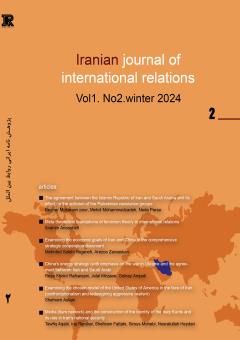China's energy strategy (with emphasis on the war in Ukraine and the agreement between Iran and Saudi Arabi
Subject Areas :reza shokri 1 * , golnaz amjadi 2 , jalal mirzaii 3
1 - Ph.D. Student of International Relations, Islamic Azad University, Rafsanjan Branch
2 - ..nadarad
3 - nadarad
Keywords: China's strategy , diplomacy , energy , defense,
Abstract :
نتیجه ترجمه Energy diplomacy is carrying out diplomatic missions in line with major development goals with the aim of improving the country's political and economic position and attracting international and regional investments and cooperation in the energy sector. Today, by benefiting from energy diplomacy, countries are trying to ensure their interests and energy security in this field as much as possible without using force. China, as the largest major energy consumer in the world, using the tool of energy diplomacy in the Middle East; Central Asia, Africa and Latin America have raised their major concerns about energy security. Energy diplomacy has become China's effective tool in determining the new global order, and this country has tried to adjust its foreign policy direction based on economic interests. China's energy diplomacy has been rapidly changing and expanding over the past two decades, and new geopolitical developments and the establishment of international regimes have strengthened this country's energy diplomacy. The main goal of this research is to examine China's strategy in the field of energy with an emphasis on the Ukraine war and the agreement between Iran and Saudi Arabia. This research with descriptive and analytical methods and library studies is an answer to the question of how the new global international developments are in line with the energy diplomacy goals of this country. China has strengthened its political legitimacy and economy by creating new investment opportunities, increasing connections with the global community and oil-rich countries, energy exports and imports. The consequences of these wars will be creating insecurity in the field of energy supply and increasing the price of energy carriers.
منابع و ماخذ:
1. جکسون، رابرت و سونسون، گئورگ(1391)، درآمدی بر روابط بین الملل، مترجمان: مهدی ذاکریان و دیگران، نشر میزان، چاپ 4.
2. کی پور، جواد.1388." دیپلماسی انرژی و منافع ملی ایران در جهان"، فصلنامه روابط خارجی، سال اول، شماره 4.
3. واعظی، محمود. 1386." الگوی آسیایی امنیت انرژی مسیری برای همکاری"، مجله راهبرد، شماره43.
4. واعظی، محمود. 1387." آسیا و امنیت انرژی"، پژوهشکده تحقیقات استراتژیک، گروه پژوهش های سیاست خارجی، پژوهش شمارع 13.
5. هادیان، حمید. 1387." سهم نیروی دریایی چین در سیاست امنیت انرژی آن کشور"، پژوهشکده تحقیقات استراتژیک، گروه پژوهش های سیاست خارجی، پژوهش شماره 13.
6. گریفن، استل.1378." ابعاد مسئله انرژی"، مجله اطلاعات سیاسی- اقتصادی، ترجمه غلامحسین حسن تاش، سال 13 شماره 7-8
منابع:
1- http:tradingeconomics.com
2- rystad energy(2022)
3- Armstrong, D., Farrell, T.,&lambert, H.(2007). International relation. Cambridge University Press.
4- Burley, A.(1993). International Law and International Relations Theory: A Dual Agenda.American Journal of International Law, 87(2), pp.205-239.
5- Bhutia, S.(2019), Who wins in China’ s great Central Asia spending spree?, Eurasianet, Available Online at:https://eurasianet. Org/who-wines-in-chinas-great-central-asia-spending-spree.
6- Cai, P.(2017), Understanding China’ s Belt and Road Initiative, The Lowy Institute for International Policy, Available Online at: https://www.Lowyinstitute. Org/ publications/understanding-belt-and-road-initiative
7- Chana Daily(2017),New pipeline broad bases gas supplies.Retrieved from Belt and Road portal, Available Online at: https://eng.yidaiyilu.gov.cn/qwyw/11213.htm.
8- Dusek, M.,& Kairouz, M.(2017), Is China pivoting towards the Middle East? Retrieved from Word Economic Forum, Avalable Online at: https://www.weforum.org/agenda/2017/04/is-china- pivoting-towards-the-middle-east/
9- Dusek, T.(2017), China’s Asian Dream. London: Zed Books.
10- Fauzisyah, V .(2018), China and UNCLOS: An inconsistevt relationship, MSc Political Science: Nationalisn, Ethnic Conflict and Development, Leiden University
11- Financial times(2017), Xi Jinping delivwrs robust defence of globalization at Davos, Available Online at: https://www.ft.com/content/67ec0-dca2-11e6-9d7c-be108f1c1dce
12- Gennari, L.(2016), Power Transitions and International Institutions: China’s Creations of the Asians Infrastructure Investment Bank, University of Pennsylvania
13- Global Times.(2017), How the Belt and Road initiative is bringing countries together. Retrieved from Global Times: A vailable Online at: http:// www.globaltimes.cn/ content/1046488.shtml
14- Hongpei, Z., & Day, C.(2017), Belt, Road boosts world cooperation. Retrieved from Global Times, Avalable Online at: http://www.globaltimes. Cn/content/1046322.shtml.
15- Keohane, R. O.(2005), After Hegemony: Cooperation and Discord in the World political Economy. Princeton: Princeton University Press
16- Keohane, R . O.( 2005), After Hegemony: Cooperation and Discord in the World Political Economy. Princeton: Princeton University Press
17- Li, X.,&uwen,Z.(2016), The Future of China’s Diplomacy in the Middle East. Retrieved from The Diplomat, Available Online at: http://thediplomat.com/2016/07/ the-future- of-chinas-diplomacy-in-the-middle-east/
18- NDRC.(2015,March 28), Vision and Actions on Jointly Building Silk Road Economic Belt and 21st- Century Maritime Silk Road. Retrieved from National Development and Reform Commision, Available Online at:http:// en.ndrc. gov.cn/newsre Lease/ 2015003/t 20150330-669367. Html
19- B.P. 2011. Energy Outlook 2030, London.
20- China Energy, pollution, Environment. 2010-2011. Facts & Statistics, in: http:// www.china-mike. Com/facts- about- china/ facts- pollution- environment- energy/ contex, Geopolitics of Energy in Eurasia.
21- Jian, Zhang.2011. China”s Energy Security: prospects, challenges, and opportunities, the Brooking Institution.
22- Leverett,Flynt, Jeffrey Bader. 2005.”Managing China-U.S.Energy Competition in the Middle East”, Washington Quarterly, winter.
23- Qinhua, xu.2007. china’s Energy Diplomacy and its Implications for Global Energy Security, FES Briefing,August.

